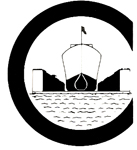Over 150 years of expertise in marine railways and floating dry docks
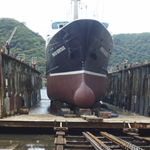 |
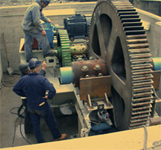 |
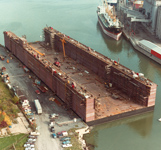 |
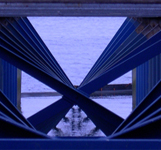 |
|
An
Introduction to Railway Dry Docks
and Transfer Systems
Part
6 - Ship Transfer Machinery
|
3. Side haul railway dry docks |
For transfer to a single berth, it is generally most economical to utilize a power take-off from the main railway dry dock hauling machine. In the case of longitudinal transfer, this can be accomplished by mounting a gypsy on the speed reducer for pulling with wire rope. For side transfer, the preferred way is by a double-drum winch driven by the hauling machine motor, with a wire rope passing through fairleads to block and tackle for pulling sideways. When there is an extensive transfer system, a separate, independent winch is far more practical. IF a cross-transfer table is to be used, this winch can be mounted as part of it so as to be able to pull the table sideways and to effect longitudinal transfer onto and off the cross transfer. Wire rope is economical for transfer operations since good mechanical advantage can be obtained by using multiple-sheave blocks. If the cables should break, the result is not catastrophic because the vessel is being moved in a horizontal plane. For transfer of a very heavy ship, possibly from land to a floating dry dock, machinery and chains of the size used for a large railway dry dock - say 5,000 tons - can propel horizontally a ship up to 25,000 tons, taking advantage of the low friction that is characteristic of the free roller system used for railway dry dock cradles. Another means that has proved economical is use of hydraulic cylinders connected to an electric power source by long umbilical cables. Next: Chains, rollers and maintenance
|
Progress...the result of never being satisfied
Crandall
Dry Dock Engineers, Inc.
Established 1854
(888) DRYDOCK crandalldd@aol.com
